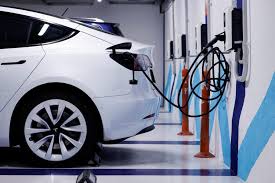Ghana is positioning itself as a key player in Africa’s green transportation revolution, as the Ministry of Energy and Green Transition reaffirms its commitment to assembling combustion engine vehicles and designing electric vehicles (EVs) tailored for African roads, using local skills and innovation.
Speaking at the 2025 China-Africa Automotive Development Forum held at the Kwame Nkrumah University of Science and Technology (KNUST) in Kumasi, Mr. Seth A. Mahu, Director of Renewable Energy and Green Transition at the Ministry, outlined Ghana’s ambitious path toward electric mobility.
He stated that significant strides had already been made under the Electric Vehicle Policy, which is anchored in the broader National Energy Transition Framework—a strategic national document that seeks to guide Ghana away from fossil fuels toward cleaner, more sustainable energy alternatives.
“This transformation is not optional. It is a national imperative,” Mr. Mahu said. “The electrification of transport lies at the heart of our green transition agenda and also our long-term industrialization goals. It presents a historic opportunity to reduce emissions, cut fuel imports, and establish Ghana as a continental hub for high-tech automotive manufacturing.”
The Ministry’s plan goes beyond importing EVs. It envisions a full local ecosystem—from component manufacturing to final vehicle assembly—all tailored for African conditions. This includes developing robust EVs that can navigate Africa’s often challenging terrain and climate.
A key part of the roadmap involves expanding Ghana’s national EV charging network. Mr. Mahu disclosed that the Ministry and the Energy Commission are rolling out a new generation of solar-grid hybrid charging stations that are clean, decentralized, and smart. These charging points will take advantage of Ghana’s rich solar energy potential to provide reliable power, even in remote areas.
“We are currently working to deploy at least 100 rapid EV charging stations nationwide within the next five years,” he revealed. “These will complement the growing network of home-based and Level 1 and 2 public chargers already being installed across the country.”
To make the EV market attractive, the government is introducing several policy incentives aimed at both local and foreign investors. These include:
Tax breaks for EV component manufacturers
Import duty waivers for 100% electric commercial vehicles
Investment support for private sector participation in EV infrastructure
Incentives to build green industrial zones focused on sustainable mobility
Mr. Mahu also acknowledged the vital role of research and academia in shaping the EV revolution. He praised KNUST’s partnership with Hubei University of Automotive Technology in China to establish an International Joint Research Centre focused on electric mobility research and development.
He encouraged universities and industry stakeholders to move from dialogue to delivery. “It’s time to bring innovation into production—locally made electric bikes, scooters, and vehicles that can serve the Ghanaian and African markets,” he said.
The forum, themed “Intelligent Manufacturing of Lightweight Electric Vehicles,” brought together a cross-section of academics, government officials, diplomats, students, and industry leaders. The event included exhibitions of locally developed electric mobility solutions, such as electric scooters, smart charging systems, and prototype EVs.
Participants emphasized the need for continued collaboration between Africa and China, not only in technology transfer but also in co-designing solutions suitable for Africa’s unique transportation and energy needs.
As Ghana pushes ahead with its EV rollout strategy, the government hopes that these initiatives will not only reduce the country’s carbon footprint but also boost industrial job creation, reduce fuel costs, and offer climate-resilient transport options to its growing urban population.
The broader goal is to create a future where Ghana leads in sustainable vehicle innovation in Africa, leveraging both local talent and international partnerships to accelerate the continent’s green transition.
